Urgent appeal issued by blood transfusion service: there's a shortfall of around 50 donations a day to serve Malaga province hospital needs
The centre has launched a summer campaign aimed at reaching donors across the Costa del Sol, from Benalmádena in the west to Rincón de la Victoria in the east and in the city itself
The care director of the Malaga centre for blood transfusion, tissue and cells, Gracia María García, has told SUR that the province requires around 250 units of blood per day for medical purposes. Currently, it is falling short, below 200. As a result, more donors are urgently needed, especially during the summer, when hospital demand rises due to an increase in the floating population. Although the number of surgical procedures tends to fall in the summer months, hospitals must continue caring for transplant patients and those undergoing chemotherapy, among others.
"It is more difficult during the summer," she said. "The daily blood needs are 250 units of blood; we process them, fractionate them and obtain red blood cells, platelets and plasma." Red blood cells last 42 days. For a single platelet transfusion, up to four donations must be pooled. Plasma is used to treat patients with bleeding or clotting disorders and is also used to manufacture medicines for those with coagulation issues or compromised immune systems.
In Malaga, the daily target of 250 units is rarely met, as usually only 160 to 180 donations are received. However, the transfusion centre is part of the Andalusian network for transfusion medicine, which allows regions with higher donation rates to supply blood to those with shortages. Malaga's goal is to consistently collect 200 units. "Granada sends us a lot of units," García said. The centre distributes blood to both public and private hospitals and, thanks to the neighbouring province's surplus, "we are managing to reach 250".
30% of blood reserves go for cancer treatment
"People should remember that healthcare services in Andalusian hospitals continue operating during the summer months," García said, "and there are times when demand for transfusions can even rise." Blood donations remain essential to meet all kinds of hospital needs. More than 75% of all blood donations are used to treat conditions that continue to be diagnosed and managed throughout the summer.
"Some 30% of reserves go towards treating cancer or haematological conditions; 20% to addressing anaemia; almost another 20% to surgical interventions, burns, or organ and tissue transplants; more than 10% to treating cardiac, gastric and kidney diseases; around 8% to trauma and accidents; another 8% to orthopaedic patients, fractures and joint replacements; and the remaining 4% to childbirth and caesareans," García said.
Drop in donor numbers
Blood donations have declined. Between 1 January and 31 May 2025, a total of 18,885 donations were recorded: 18,136 of blood and 749 of plasma. This is fewer than during the same period last year, when 19,004 blood and 791 plasma donations were collected.
Over the same five-month period, some 2,162 new donors were registered - an 11% drop compared to the 2,719 who signed up during the same timeframe in 2024.
The typical blood donor in Malaga is a man over the age of 40 who donates at mobile collection points. Among younger donors, however, the gender split is roughly equal.
Around 79% of blood, plasma and platelet donations in Malaga come from mobile units travelling across Andalucía. Only 20.5% of donors visit fixed collection centres.
On Wednesday, García stated that, since blood cannot be produced, donations are the only way to save lives. A single donation, which takes about 20 minutes, can help save three lives by providing red blood cells, plasma and platelets.
The centre has launched a summer campaign aimed at reaching donors across the Costa del Sol, from Benalmádena in the west to Rincón de la Victoria in the east and in the city itself. "These are areas with a larger holiday population, so even if people are away from home, they can still donate," García said.
People who donate blood should be between 18 and 65 years of age and weigh at least 50 kilos. They should not suffer from chronic diseases or have an acute infection; they should not be anemic or carry the risk of spreading diseases such as hepatitis, syphilis or AIDS. It is mandatory to bring identity documents such as DNI, passport or TIE cards and it is advisable not to go on an empty stomach. Men can donate blood up to four times a year and women three, with a minimum interval of two months between donations. Specific plasma donors can donate every 15 days. However, anyone who lived in Britain for 12 months or more between 1980 and 1996, or spent an nonconsecutive amount of time in the UK equalling 12 months during that period, is not allowed give blood in Spain because of fears they could transmit Creutzfeldt–Jakob disease (CJD), also known as subacute spongiform encephalopathy or 'mad cow' disease.
Those interested can find out more at www.donantemalaga.org. This year's motto is 'Donate blood, donate hope, together we save lives'.

